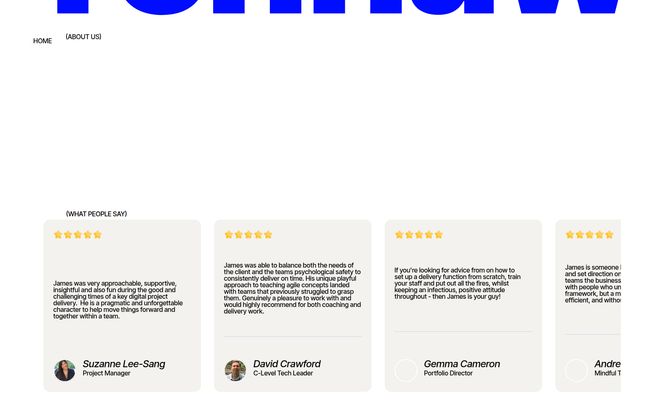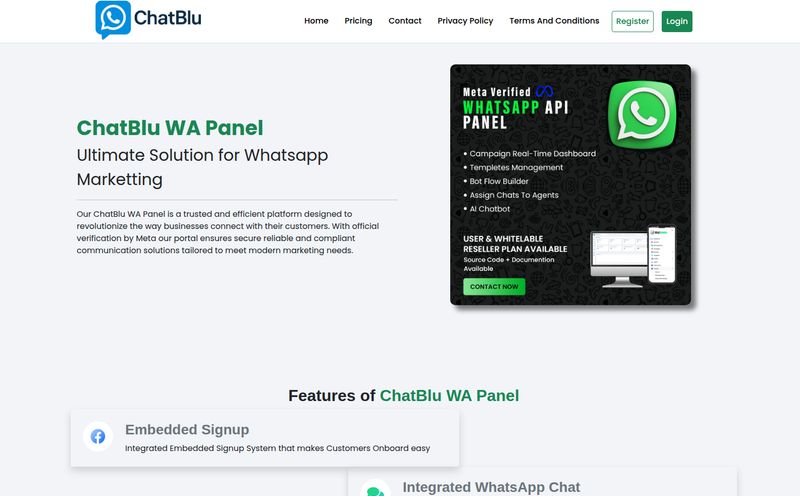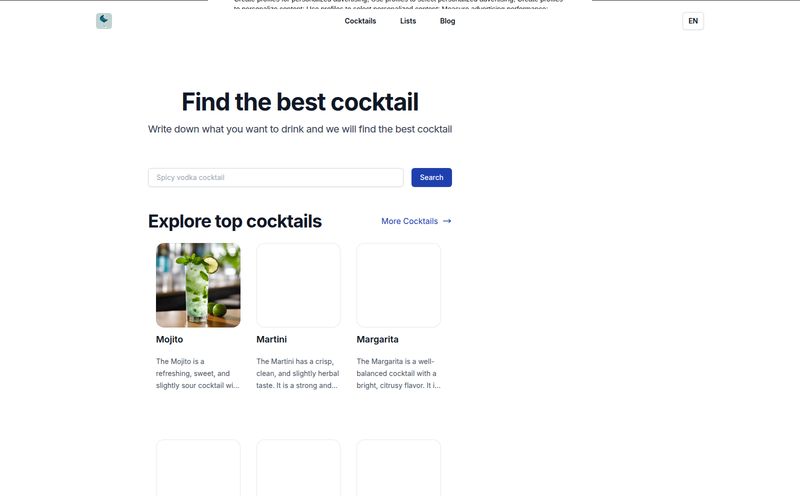We've all been in that meeting. The weekly 'progress' update where everyone goes around the room saying their bit is “90% done” for the third week in a row. The project manager is sweating, the charts on the slide deck are a lovely shade of wishful-thinking green, but everyone in the room knows the truth. We’re flying blind. We're guessing. We are burning time and money, and the only thing we're delivering consistently is anxiety.
For years, I've seen teams try to solve this with more process. More meetings, more spreadsheets, more tools that promise the world but just add another layer of complexity. It often feels like we're just rearranging the deck chairs on the Titanic. That's why when I stumbled across a platform like Tenhaw, my cynical, battle-scarred PM heart skipped a beat. They’re talking about using AI and data not just to track tasks, but to de-risk delivery and actually measure value. Now that’s a conversation I’m interested in.
So, What on Earth is Tenhaw?
First off, calling Tenhaw just another project management tool is like calling a Swiss Army knife just a knife. It’s not quite right. From what I've gathered, it’s a hybrid: part AI-driven delivery management platform, part expert consultancy. The whole idea is to stop making what James Rooney, their Founder, calls “bad guesses.” And I love that quote: “A decision made without data is usually just a bad guess.” Amen to that.
Tenhaw connects to your existing systems, sucks in the data, and then uses AI simulations to basically give you a weather forecast for your projects. It’s designed to help you see the icebergs before you hit them. The goal isn't just to ship features faster; it's to ship the right things, predictably and consistently. They're positioning themselves as a value-driven partner, which tells me they're focused on outcomes, not just output.
The Core Features That Actually Matter
Look, any platform can show you a Gantt chart. I'm more interested in the stuff that actually moves the needle. Tenhaw has a few features that genuinely feel different.
An AI Crystal Ball for Delivery Risk
This is the headline act. Tenhaw’s AI-powered risk assessment promises to identify potential blockers and delivery risks before they become full-blown emergencies. Think of it as moving from reactive firefighting (which, let's face it, is most of a manager’s job) to proactive problem-solving. It analyses your team's historical data to forecast delivery dates and flag potential issues. In my experience, most 'risks' logged in Jira are just generic placeholders. An AI that can spot a genuine pattern of delay before it happens? That’s something else entirely.
Finally, Automated (and Useful) Status Reports
I have a special kind of hatred for manually compiling status reports. It's a soul-crushing, time-consuming task that’s usually out of date the moment you hit send. Tenhaw automates this, pulling real data to create reports that reflect reality, not just someone’s optimistic summary. This frees up team leads and managers to do actual, you know, managing and coaching, instead of being spreadsheet monkeys.

Visit Tenhaw
More Than Just a Team-Building Exercise
Here’s something that really stands out: the built-in team Retrospectives and Health Checks. A lot of companies pay lip service to Agile, but their retros are just glorified complaint sessions where nothing ever changes. Tenhaw seems to bake this into the process, providing a structured way to gather feedback and, more importantly, track team health over time. They specifically mention focusing on team psychological safety, and this is a massive green flag for me. A burnt-out, scared team will never be a high-performing team. It's a simple truth that the Agile-industrial complex often forgets.
The Tenhaw Philosophy: It's All About Value (and People)
A tool is just a tool. What makes a difference is the philosophy behind it. Tenhaw seems to get that it's not just about the tech; it's about changing how you think about work.
Moving Beyond 'Busy Work' to Real Impact
We’ve all seen it: teams that are incredibly busy but not actually achieving much. They close hundreds of tickets, but the business doesn't see any real benefit. Tenhaw's emphasis on value tracking is designed to combat this. It helps you connect the work your software teams are doing to tangible business outcomes. This helps prioritize what to work on next and justifies the team's existence to the higher-ups in a language they understand: results.
The Human Element with Coaching and Safety
This is where the consultancy side comes in. The testimonials I saw weren't about the slickness of the UI; they were about James and his team being “supportive,” “insightful,” and “fun.” One person mentioned he had the “perfect character to help move things forward.” That’s not something you get from an off-the-shelf SaaS product. This blend of a smart platform with tailored training, workshops, and a focus on psychological safety feels potent. It acknowledges that you can’t just install a piece of software and fix deep-seated organizational issues. You need a guide, and Tenhaw seems to want to be that guide.
Let's Talk Brass Tacks: The Good and The... Less Good
No tool is perfect, and I always look for the catch. Based on what's available, here's my honest breakdown of Tenhaw.
The Upside of Tenhaw
There's a lot to like here. The approach is unapologetically data-driven, which is the only way to manage complex software delivery. The focus on predictability and value delivery is exactly where the industry needs to go, moving away from vanity metrics. Their deep expertise in Agile methodologies is clear, but they seem pragmatic, not dogmatic. And the fact that they offer tailored solutions and emphasize team psychological safety suggests they're playing the long game, aiming to create lasting change, not just sell a subscription.
Some Potential Hurdles to Consider
Okay, let's talk about the elephant in the room: pricing. It’s nowhere to be found on their website. This usually means one thing: it’s not cheap. This is likely a solution that requires a significant investment, not just in the platform but in their consultancy services. That's not necessarily a bad thing—you get what you pay for—but it does mean this isn't for the startup bootstrapping on a budget. Furthermore, its effectiveness hinges entirely on an organization's commitment to change. If your leadership isn't truly on board with embracing data and trusting the process, Tenhaw could just become expensive shelfware. A tool can't fix a toxic culture on its own.
So, Who Is This Really For?
After digging in, I've got a pretty clear picture of the ideal Tenhaw customer. This isn't for a five-person startup trying to ship an MVP. This is for an established, mid-to-large-sized organization that feels the pain of unpredictable delivery. It’s for the Head of Engineering or CTO who is tired of giving bad news to the board, for the company that has multiple software teams and struggles to see the big picture. Most importantly, it's for an organization that is mature enough to recognize that their problems are systemic and is ready to invest in both a powerful platform and the expert guidance needed to make it work.
Frequently Asked Questions about Tenhaw
What is Tenhaw in a nutshell?
Tenhaw is a delivery management platform and consultancy that uses AI and your team's data to help you deliver software predictably, de-risk projects, and track the business value you're creating.
Is Tenhaw just another project management tool like Jira or Asana?
No. It's not designed to replace those tools. Instead, it integrates with them. Think of it as an intelligence layer on top of your existing task management systems, providing forecasting, risk analysis, and value tracking that those tools don't offer.
How much does Tenhaw cost?
The pricing isn't publicly listed. This suggests a custom pricing model based on the organization's size, needs, and the level of consultancy required. You'll have to contact them for a quote.
Does Tenhaw replace our Agile coach?
It could augment or even, in some cases, fulfill that role. The platform provides data and structure for processes like retrospectives, while the consultancy side offers expert coaching and training. It’s a hybrid model.
What makes Tenhaw different from other platforms?
Its key differentiators seem to be the combination of an AI-powered forecasting engine with a hands-on, human-centric consultancy that prioritizes things like psychological safety and tailored solutions.
Is it hard to get started with Tenhaw?
Given its consultancy-led approach, the initial setup probably requires close collaboration with their team. This isn't a self-serve tool you just switch on. The investment is in the partnership and guided implementation, which likely makes the process smoother but more involved than a simple SaaS product.
My Final Take on Tenhaw
I'm cautiously optimistic. I’ve seen too many “silver bullet” solutions to get carried away, but Tenhaw is saying all the right things. They're tackling the right problems: predictability, value, and team health. The blend of sophisticated AI with human expertise is, in my opinion, the only way to solve the complex, messy problems of software delivery.
It’s not a magic wand. It requires real investment and a genuine desire to improve. But for the right company—one that’s sick of guessing and ready to build a data-driven, people-first delivery culture—Tenhaw could be less of a simple tool and more of a genuine transformation partner. And in this industry, that's saying somethig.



